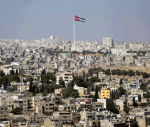You are here
Knesset ban on UNRWA: International violations and regional impact
Oct 30,2024 - Last updated at Oct 30,2024
In a move that sparked widespread controversy and created tensions at the regional and international levels, the Israeli Knesset recently voted in favor of a resolution to ban the activities of the United Nations Relief and Works Agency for Palestine Refugees (UNRWA) inside Israel and in some occupied Palestinian territories. This decision is unprecedented in that it targets a United Nations institution concerned with caring for Palestinian refugees and providing them with educational, health and social services. Observers believe that this vote represents a flagrant violation of international agreements and treaties and the United Nations Charter, in addition to being a challenge to the basic principles of international humanitarian law.
UNRWA was established in 1949 after the Nakba that befell the Palestinian people in 1948, and it is the only United Nations organization that provides direct services to refugees through programs in the fields of education, health and social relief. UNRWA is committed to providing support to more than 5.7 million Palestinian refugees in various areas, including the West Bank, Gaza Strip, Syria, Lebanon and Jordan. UNRWA’s role reflects the international community’s commitment to supporting Palestinian refugees until a just solution is found to their plight.
Some Israeli politicians see UNRWA as playing a role in promoting the “refugee narrative” and that its services preserve the rights of Palestinian refugees and support their right of return, which for Israel represents a demographic threat. These politicians believe that reducing UNRWA’s activities will reduce the discussion of the refugee issue as part of a long-term strategy aimed at bypassing this issue or liquidating it as one of the terms of the final solution.
Some analysts also point out that the decision comes within a broader context, in line with Israeli attempts to change the legal and political status of some occupied Palestinian areas, especially in East Jerusalem, which UNRWA describes as one of its core areas of operations, while Israel sees it as its “unified capital”. This tension reflects a deep dive between Israel and the international community regarding the status of Jerusalem and the status of Palestinian refugees.
This Israeli decision is a clear violation of the UN Charter, which emphasises the need for cooperation between member states and international organisations in order to maintain international peace and security and provide humanitarian assistance. By banning UNRWA, Israel ignores the role of the United Nations and undermines the independence of its agencies, which constitutes a flagrant violation of its obligations as a member state of the organisation.
In addition, this ban constitutes a violation of the principle of “non-discrimination”, which is a foundation of international law, whereby humanitarian assistance is provided regardless of nationality or race. It is well known that UNRWA provides its services exclusively to Palestinian refugees due to their special status, which was recognized by the UN General Assembly and confirmed by the international community.
The Knesset’s action falls within a series of potential violations of international humanitarian law, especially since international law imposes on occupying states the duty to protect the rights of the civilian population in areas under their control and to ensure the delivery of humanitarian assistance. International humanitarian law, which derives its provisions from the Geneva Conventions, prohibits any restrictions that impede humanitarian work directed at populations in need. International humanitarian law emphasises the importance of the “neutrality” of humanitarian organisations and their non-interference in political conflicts, a principle that UNRWA respects in its work, as its mission is limited to providing support to Palestinian refugees without intervening in the conflict. Therefore, banning its work in the Palestinian territories constitutes a restriction on this humanitarian work and increases the suffering of Palestinian refugees.
There is no doubt that the decision to ban UNRWA may negatively affect stability in the region, as the presence of this agency contributes to alleviating the economic and social pressures on Palestinian refugees who suffer from difficult conditions, especially in besieged areas such as Gaza. With the ban on its activities, the suffering of refugees will increase, which may lead to inflaming the situation and creating more tensions in the region.
In addition, this decision may push UN member states to reconsider their relations with Israel, especially those countries that primarily support UNRWA’s budget, which may reflect on Israel’s international image and weaken its positions before the international community.
The United Nations and a number of countries condemned the Israeli decision, considering it an undermining of humanitarian work and a disregard for international obligations. The UN Secretariat also called on Israel to reverse its decision and allow UNRWA to freely carry out its duties in providing services to Palestinian refugees.
This decision comes at a time when funding for UNRWA is severely depleted due to the withdrawal of some donor countries, which increases the agency’s burdens and puts it in a difficult position that threatens its ability to provide basic services. The Israeli decision will further complicate the situation and make providing assistance to Palestinian refugees an additional challenge.
The Israeli Knesset’s vote to ban UNRWA represents an escalation in the face of the international community, as this decision violates all international conventions and laws that guarantee the right of refugees to receive humanitarian assistance and protect them from discrimination and marginalisation. This decision increases the likelihood of escalation in the region, deepens the suffering of Palestinian refugees and deprives them of the services they depend on.
The current situation requires a decisive stance from the international community to compel Israel to abide by UN conventions and international laws, so that UNRWA can continue to perform its humanitarian role in serving Palestinian refugees, in a manner that preserves their dignity and alleviates their humanitarian suffering.
Hasan Dajah is professor of strategic studies at Al Hussein Bin Talal University














Add new comment